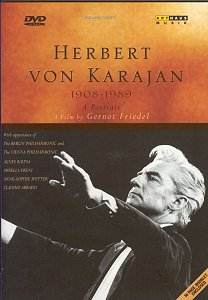Herbert von Karajan died in 1989, and this 90-minute
film by Gernot Friedel, produced ten years after Karajanís death, presents
a portrait of both man and conductor through a loosely biographical
general narrative, archive interviews and rehearsal footage, and extracts
from filmed performances. As such it might have offered a valuable insight
into aspects of the artistry and personality of one of the most extraordinary
and controversial musicians of the twentieth century. Regrettably it
does not do so.
With so much material at his disposal, most of it doubtless
provided by the Herbert von Karajan Centrum in Vienna which produced
the film, the film-maker approaches his subject with a vagueness of
focus which reduces much of the film to inconsequentiality. Crucial
moments in Karajanís career, major historical events, personal reminiscence,
trivial anecdote, exaggerated praise or unjustified criticism Ė all
are compounded in a narrative characterized by both naiveté and
pretentiousness. The film-maker seems to have made the fundamental error
of not establishing a clear target audience in his mind from the outset,
with the result that the film oscillates between childish simplicity
and what for many would now be either inexplicable or unimportant details
concerning such matters as a requirement to play the ĎHorst Wessel songí
on a particular occasion, Karajanís long-lasting Ė but never fully explained
- rivalry with Wilhelm Furtwängler, or the final breakdown of the
conductorís relationship with the Berlin Philharmonic Orchestra.
Richard Osborneís monumental study of Karajan, also
published in 1999, (Pimlico ISBN 0-7126-6465-3) sets a standard for
critical biography and admirably judicious analysis of its material
which this film does not begin to approach. A visual medium will always
run the danger of encouraging its user to deploy all its features in
ways which ultimately detract from rather than enhance the subject being
studied, but the films on music and musicians by Christopher Nupen and
Larry Weinstein, to name just two outstanding examples, show what can
be achieved when inspiration and sound artistic judgement are allied.
That Gernot Friedelís film on Karajan cannot be considered in the same
light is greatly to be regretted, since the ways in which a study of
Karajan might be presented are both numerous and obvious. The life of
the Austrian conductor as a dominant force in European and world music
for some fifty years certainly merits detailed examination, as would
a purely biographical study of his complex and controversial personality,
or a detailed critique of his work as director in the opera-house. But
what would be of greatest value now, a considerable number of years
after his death, would be a serious attempt to deal with the quality
of his music-making, and of the reasons for his pre-eminence across
such a wide repertoire of music. Sections of the film by Friedel do
give some insight into this Ė the quiet rehearsing of a passage from
the Adagio of Beethovenís 9th Symphony, an exquisite extract
from a production of Der Rosenkavalier, or the energy with which
the old and now crippled maestro brings to life a score which was new
to him, Richard Straussís Alpine Symphony - but such moments
are tantalizingly brief.
Music being both an aural and a visual experience,
a study of Karajan such as the one by Richard Osborne in book form,
outstanding though it is, can give only a limited idea of the nature
of the manís devoted, passionate and inspiring music-making, whether
in rehearsal, in the opera-house, or on the concert platform. For that
we must have sound and vision, and Friedelís film offers very little
in this regard to satisfy the serious music-lover. Though it contains
several memorable and even revelatory sequences, this anniversary publication
is deeply disappointing. The definitive film about Herbert von Karajan
has yet to be made.
Paul Teal


